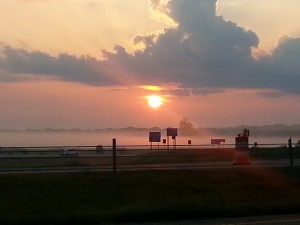 The sun rose beautifully on Memphis today. And when the sun rose the gospel rose with it.
The sun rose beautifully on Memphis today. And when the sun rose the gospel rose with it.
I wonder if we might overplay our hand when we make the creation accounts in Gen 1-2 merely about, well, creation. Is God merely trying to explain how things came to be, the science of origins? Or is God weaving in the created order the very fabric of the gospel he will work out in Christ for all the world to see? Is Gen 1-2 simply about creationism or ultimately about the gospel of Jesus Christ?
Creation is certainly about more than chronology and cosmology. Creation is primarily about theology in general and Christology in particular. After all,
…by [the beloved Son] all things were created, both in the heavens and on earth, visible and invisible, whether thrones or dominions or rulers or authorities – all things have been created through him and for him” (Col 1.16).
For the Christian, “general revelation” (creation and conscience) becomes Christological revelation as everything “in the heavens and on earth” display Christ’s excellencies. In that sense, all of creation is sacramental as much as it is elemental.
Each morning the sun “is as a bridegroom coming out of his chamber; it rejoices as a strong man to run its course. Its rising is from one end of the heavens, and its circuit to the other end of them; and there is nothing hidden from its heat” (Ps 19.5-6).
Jesus said the Psalms prepare us for he is and what he does (Lk 24.44). The New Testament and Jesus in particular repeatedly use the Psalms to explain who he is (Mt 22.41-46), what he’s doing (Mk 14.20f.; Lk 23.46) and what is happening to him (cf. Mk 14.34; Jn 19.24). The apostles used the Psalms to ground the early church in a robust Christology (Acts 2.25-31, 34-36; 13.32-37).
Therefore, we should expect Psalm 19 to do more than fill our hearts at a seaside sunrise. It should compel us toward thoughts and worship of Jesus. Risking an allegorical hermeneutic, it’s no accident Jesus was known as the “bridegroom” (Mt 9.14f.; 25.1-13; Rev 19.7) and an unstoppable “strong man” (Mt 12.29) from whose “heat” no one can escape (Heb 4.13). The sunrise David described in Ps 19 shows the Christian more than its “intelligent design.” It is as much created for Christ as it is by him.
As early as Gen 1.2-3 we learn each sunrise proclaims the good news that light, God’s light, always overcomes darkness. God wove into the very fabric of the created order the reality that light will always overcome darkness. And that prepares us for the reality Paul described in 2 Cor 4.6:
For God, who said, “Light shall shine out of darkness,” is the One who has shone in our hearts to give the Light of the knowledge of the glory of God in the of Christ.”
God’s light-creating power at creation paved the way for his gospel-giving power at our redemption. The light that overcame darkness at creation echoes the Light that overcomes the darkness of our hearts in new creation. And no matter how dark the night is, the sun will soon rise and dispel it. Every day, everywhere.
Just as marriage serves an earthly, parabolic and Christological function (Eph 5.22-33) that will one day end (Mt 22.23-33), so too the sunrise:
And there will no longer be any night; and they will not have need of the light of a lamp nor the light of the sun, because the Lord God will illumine them; and they will reign forever and ever” (Rev 22.5).
With every sunrise God declares the triumph of light over darkness (Ps 19.4). And that feeds our hope for today, a day that will soon end in darkness. Indeed, a life that ends in darkness. The day is coming, though, when the sun rises for the last time and the Light of the world (Jn 1.4-5; 8.12) will no longer be veiled by clouds and shadows nor will it burn those who see it. The night of weeping will be overcome by the morning’s joy (Ps 30.5) when the “Sunrise from on high will visit us” (Lk 1.78). Every sunrise since Gen 1 has been building that eternal hope in us. Night is temporary. Light wins every time until He wins forever.
The God who “is Light, and in [whom] there is no darkness at all” (1 Jn 1.5) will allow for no night in the new creation. Jesus will at last have overcome the darkness of our own hearts once and for all.
Dayspring of eternity!
Hide no more Thy radiant dawning!
Light from light’s exhaustless sea,
Shine on us afresh this morning!
And dispel with glorious might
All our night.
Let the glow of love destroy
Cold obedience faintly given,
Wake our hearts to love and joy
With the flushing eastern heaven;
Let us truly rise ere yet
Life hath set.
Through this dark and tearful place
Never be Thy light denied us.
O Thou glorious Sun of grace,
To yon world of gladness guide us,
When to joys that never end
We ascend!
Ah! Thou Dayspring from on high
Grant that at Thy next appearing
We who in the graves do lie
May arise, Thy summons hearing,
And rejoice in our new life,
Far from strife.
Light us to those heavenly spheres,
Sun of grace, in glory shrouded;
Lead us through this vale of tears
To the land whose days unclouded,
Purest joy, and perfect peace
Never cease.
(Christian von Rosenroth, 1664)
Post tenebras lux.